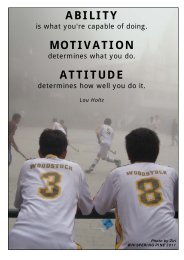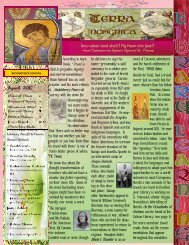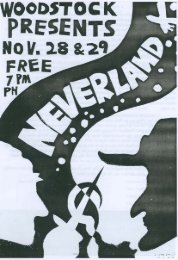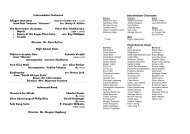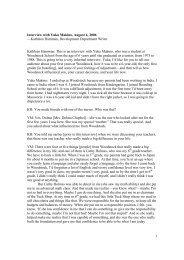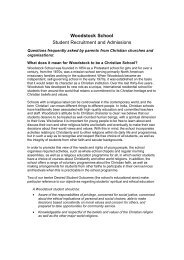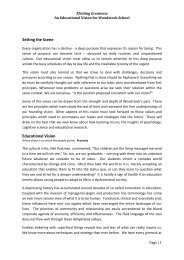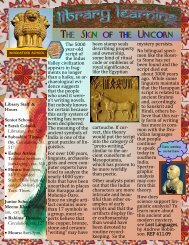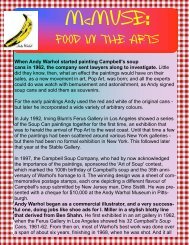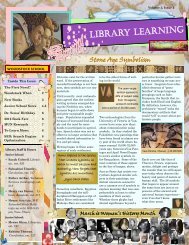Woodstock School Alumni Magazine Vol CIV, 2011
Woodstock School Alumni Magazine Vol CIV, 2011
Woodstock School Alumni Magazine Vol CIV, 2011
Create successful ePaper yourself
Turn your PDF publications into a flip-book with our unique Google optimized e-Paper software.
16 - Quadrangle<br />
Baccalaureate address<br />
A Time to Remember<br />
Rev. Dale Seefeldt ’64<br />
Dr. Laurenson, esteemed teachers, staff, parents;<br />
honored members of the Class of <strong>2011</strong>:<br />
Mrs. Seefeldt and I are delighted to be back<br />
at <strong>Woodstock</strong> to celebrate the end of a great<br />
school year and the graduation of a distinguished<br />
group of students. Thank you for the<br />
opportunity to be here…and for the honor of<br />
being invited! I know all of you will understand<br />
if I address my remarks primarily to the<br />
members of the graduating class.<br />
In 1965, near the end of my first year in college,<br />
a rock group called the Byrds—yes, we<br />
did have rock music back then—came out<br />
with a hit song protesting the Vietnam War.<br />
The title was “Turn, Turn, Turn.” They took<br />
the words of Ecclesiastes 3:1-8, our text, adding<br />
the line, “I swear it’s not too late,” after<br />
the final verse about war and peace-a word<br />
pair that had also attracted the attention of<br />
Leo Tolstoy. So if it helps you listen, we are<br />
talking about rock music!<br />
But these are originally the words of Solomon,<br />
the king of Israel known for his wisdom<br />
and for the prosperity his people enjoyed.<br />
Part of what he has to say is summed up<br />
in his first couplet: “There is a time for<br />
everything, and a season for every activity<br />
under the heavens.” Here you can see<br />
the parallelism that is essential to Hebrew<br />
poetry—the same idea repeated in different<br />
words, slightly rephrased, or two ideas related<br />
because they are opposites, as in the next<br />
fourteen lines. As soon as you recognize this<br />
structure, you begin to understand what the<br />
poet is doing. He’s talking about the whole<br />
of human life— “everything…every activity<br />
under the heavens.” In fact, his first pair of<br />
contrasts sets parentheses around all human<br />
life, beginning with birth and ending with<br />
death—nothing is left out. The following<br />
pairs are similarly—and stunningly—broad.<br />
They make you respond and readily agree<br />
because they are fundamentally human and<br />
true for just about anyone: “a time to plant<br />
and a time to uproot” (gardeners do it all the<br />
time); “a time to tear down and a time to<br />
build” (we can look out the window and see<br />
that, no matter where we live!); “a time to<br />
weep and a time to laugh” (just look around<br />
you at the graduation ceremonies tomorrow!).<br />
You’ll notice there’s even a time to keep silent—an<br />
important lesson! In another place<br />
Solomon says, “Even a fool who keeps silent<br />
is considered wise; when he closes his lips,<br />
he is deemed intelligent!” This is a strategy<br />
worth considering as you start college! So the<br />
poet is saying that each of these very different<br />
activities has an appointed time.<br />
This sounds reasonable, but when the list is<br />
ended, he has something more to add: God is<br />
the One who appoints the time. Verse eleven<br />
completes the thought of verse one: “He has<br />
made everything beautiful in its time. He<br />
has also set eternity in the human heart, yet<br />
no one can fathom what God has done from<br />
beginning to end.” In other words, there is a<br />
time for everything that happens to you, and<br />
you can have confidence that God designed<br />
your “times” to be beautiful—even if you<br />
can’t understand how they all fit together just<br />
yet. Having a sense of these “times” helps<br />
us be ready for the bad times as well as the<br />
good—they, too, are part of the rhythm of life.<br />
With God in the picture, life makes sense.<br />
Without Him in the picture, it is hard to find<br />
purpose and meaning in what happens to us.<br />
In fact, this is Solomon’s underlying thesis<br />
throughout his book. In chapter twelve he<br />
advises, “Remember your creator in the days<br />
of your youth.” Along with the planting and<br />
uprooting that is happening to you, along<br />
with the mourning and dancing, the weeping<br />
and laughing that tomorrow brings, you have<br />
come to a time when it is also important to<br />
remember.<br />
First of all, remember where you came from.<br />
Remember the parents who brought you here.<br />
Remember your home, your family, your<br />
land. I’m reminded of the joyful words that<br />
burst out from Jaishankar Prasad at India’s<br />
independence:<br />
अरुण यह मधुमय देश हमारा।<br />
जहाँ पहुँच अनजान क्षितिज को<br />
मिलता एक सहारा।<br />
सरस तामरस गर्भ विभा पर<br />
नाच रही तरुशिखा मनोहर।<br />
छिटका जीवन हरियाली पर<br />
मंगल कुंकुम सारा।।<br />
लघु सुरधनु से पंख पसारे<br />
शीतल मलय समीर सहारे।<br />
उड़ते खग जिस ओर मुँह किए<br />
समझ नीड़ निज प्यारा।।<br />
बरसाती आँखों के बादल<br />
बनते जहाँ भरे करुणा जल।<br />
लहरें टकरातीं अनंत की<br />
पाकर जहाँ किनारा।।<br />
हेम कुंभ ले उषा सवेरे<br />
भरती ढुलकाती सुख मेरे।<br />
मंदिर ऊँघते रहते जब<br />
जग कर रजनी भर तारा।।<br />
—जयशंकर प्रसाद<br />
Prasad conjures up the images of beauty in<br />
a new dawn, even the far horizon finding a<br />
refuge, birds feeling at home, each finding her<br />
own beloved nest, clouds like monsoon eyes<br />
weeping merciful rain, and the eternal waves<br />
of the sea finding a shore at last. I remember<br />
my delight the first time I read this poem—<br />
delight at the poet’s intense, unabashed joy in<br />
the smallest details of his homeland. It is right<br />
for you to take joy in where you come from<br />
and who you are. I have learned much from<br />
the parents of many of you as they have come<br />
to visit the <strong>School</strong> over the years you have attended.<br />
<strong>Woodstock</strong> would be nothing without<br />
their searching questions, their patience, their<br />
love and ready involvement in what happens<br />
here. Remember where you came from—and<br />
cherish it. Its value is beyond reckoning.<br />
This is a time to remember. Look back,<br />
remember where you came from. But look<br />
around you too, remember where you are<br />
now. Remember what you have learned here,<br />
how you have grown. Remember your teachers<br />
and your friends. Remember whom you<br />
have loved, what you have shared. In short,



